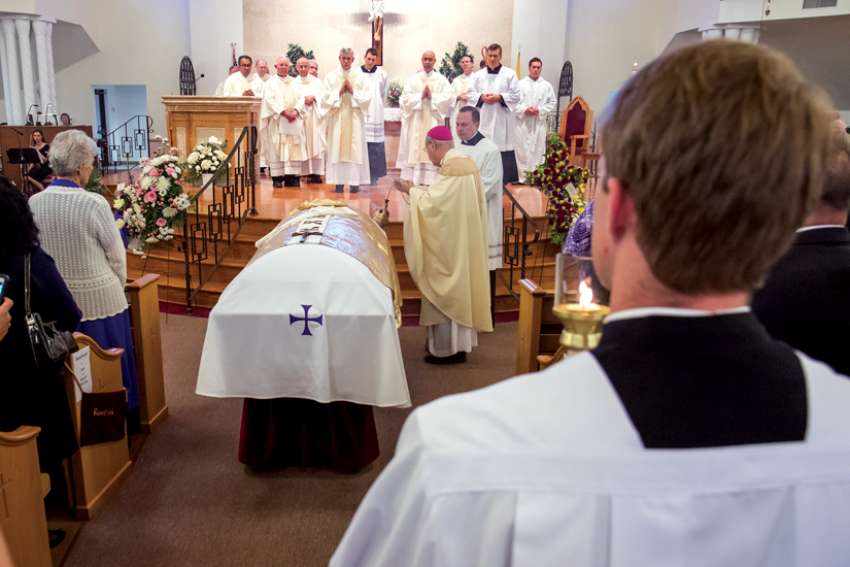Maria and her husband John had been very active in the parish for several decades. When John died 10 years ago, Maria made sure that a funeral Mass was celebrated in the parish for her husband before he was buried.
When Maria died, the parishioners learned that her body had been taken to another location — not a place of worship — for what the family described as a “celebration of her life” before she was buried. The pastor told me that some of the parishioners who knew Maria and John were very upset that her body was not brought into the parish church for a funeral Mass. They wondered what made the family of Maria decide to do what they did.
In fact, we can see from obituaries in any daily newspaper, or we may hear from families and friends, that choosing some place other than a place of worship for the funeral of a departed loved one is becoming common.
Every religious faith tradition recommends the celebration of a funeral ritual for a deceased faithful before the remains are taken to a place of rest. At the Second Vatican Council, the bishops decreed that Catholic Funeral Rites should proclaim more clearly the paschal character of the death of a Christian, sharing in the dying and rising of Jesus Christ (Constitution on the Sacred Liturgy, Sacrosanctum Concilium, 81).
It has been the tradition in the Church that a Christian funeral is celebrated for a baptized person before the remains are taken to a place of committal. The liturgical books describe several funeral rites, including Masses for the Dead. However, among these celebrations, the funeral Mass “holds first place” in the Catholic Church.
The recent updated publications by the Canadian Conference of Catholic Bishops (CCCB) of the Order of Christian Funerals (OCF) and the Supplement for Celebrations with Cremated Remains have made it easier for priests to celebrate funeral Masses with the body or cremated remains.
What is a funeral Mass? Like any other Mass, a funeral Mass is the celebration of the saving mystery of Christ’s death and resurrection. It is usually celebrated before the body or the cremated remains of the deceased are taken to a place of rest.
The celebration is full of symbolism of the Christian faith. It begins at the back of the church where the body in a coffin is received. The closed coffin is sprinkled with holy water and covered with a pall symbolizing the day of baptism when the deceased “was welcomed into the Church giving new life in Christ and clothed with a garment of salvation.” The celebration continues in the church where the coffin is placed at the front next to the Easter Candle that symbolizes the Risen Lord in His glory. Then the Mass continues as usual.
We are all aware of the sensitive issue regarding a eulogy — a speech praising the deceased person. The OCF does not include a eulogy in the funeral Mass because the celebration focuses on the saving mystery of Christ. A eulogy can be given during the vigil service for the deceased or at a reception after the funeral Mass. The homily needs to reflect the faithful life and the witness of the deceased because a faithful life serves to continue to build the community of the person.
The concluding part of a funeral Mass is the Rite of Final Commendation. The presider leads the congregation in prayer to express their farewell, affection and respect to the deceased. There is a sprinkling of holy water on the casket symbolizing Baptism and eternal life followed by incensing which “rise to God, who has called the baptized (whose body became a temple of the Holy Spirit) to share in His glory.” After the prayer of commendation, the body or the cremated remains of the deceased are taken to his/her place of rest. All the symbols used in the celebration of a funeral Mass are reminders of the Christian faith journey to God. The celebrations with cremated remains are detailed in the Supplement of OCF.
Why is a funeral Mass an important part of the life of a Roman Catholic? At a funeral Mass we celebrate the Eucharist — “food for the journey” — as we ask God to “grant that strengthened by this sacrament, our brother/sister may come to the eternal table of Christ.”
As secularism becomes more prevalent, it seems more people, including Catholics, are moving away from the traditions of the faith and they may have different perspectives surrounding death and eternal life.
Many non-practising Catholics may also tend to associate the celebration of a funeral Mass to only those who practised their faith. But this is not so. It is important for us to know that in the Christian faith tradition, it is the responsibility of the members of a believing community to care for its people. So, when the earthly pilgrimage of a member comes to an end, even if he or she didn’t practise the faith, a funeral Mass before burial becomes the final act that a caring community can offer for the deceased.
To help communicate the importance of the funeral as part of the Christian journey, the estate planning team of the archdiocesan Catholic Cemeteries has been promoting seminars about Catholic traditions around burials and funerals. Such seminars help the faithful ensure that everybody’s wishes about funerals may be legally protected and respected by others.
Our Scriptures tell us whether we live or die, we belong to the Lord who has promised us eternal life through His death and resurrection. At the Mass, as we commend the one who has died to God, we also pray that the hope of the Resurrection that sustained the baptized on Earth may be fulfilled in Christ in the heavenly Jerusalem.
(Fr. Acheampong is pastor at Our Lady of Peace Parish in Toronto.)


